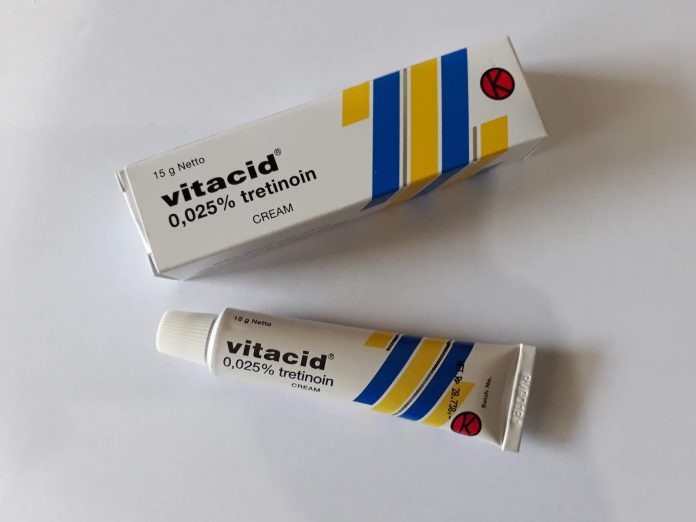Your skin’s top layer is designed to protect you & hold in moisture. But it’s also important for smoothness, elasticity & tone.
Noninflammatory acne (blackheads & whiteheads) & inflammatory acne (red, inflamed pimples) are caused by clogged pores filled with oil & dead skin cells. Tretinoin helps clear them by gently exfoliating.
What is Tretinoin?
Tretinoin is a topical vitamin A derivative that’s been shown in scientific studies to reduce, reverse and prevent wrinkles. It also helps treat age spots and lightens acne scarring. It also strengthens the skin at a structural level, making it look younger.
It also keeps pores clear, shrinks oil glands and blocks inflammatory pathways that cause acne. It’s the best-studied tropical product for treating fine lines and wrinkles.
When you start using tretinoin, your skin may become flaky or dry and might feel warm or hot when you rub it in. This is the reaction to tretinoin increasing your cell turnover rate. It’s normal and should go away in a few weeks. You should avoid sun exposure while using tretinoin or any retinol products, since your skin is more sensitive to sunlight and can burn more easily.
How Does Tretinoin Work?
The retinoid is able to speed up skin cell turnover and make dead cells die faster, allowing fresher new ones to take their place. This helps to minimize fine lines and wrinkles, evens out discoloration and improves the appearance of pores.
Retinoids also stimulate collagen production to help firm and plump the skin. They can also lighten hyperpigmentation spots and fade acne scars.
Dr Elif Benar recommends starting a tretinoin regimen in the teens and twenties to get the most benefit, but it’s never too late to begin one. She advises patients with sensitive skin to try a low dose (just a pea-sized amount) and start slowly.
Be careful not to combine tretinoin with exfoliating acids or harsh cleansers that may irritate the skin. You should also avoid sun exposure while using the treatment.
How Long Does Tretinoin Take to Work?
Tretinoin works by boosting collagen, shrinking oil glands, & lightening pigmentation. It also treats acne by opening pores, clearing out pimples & preventing future breakouts. It can help reduce fine lines & wrinkles, especially around the mouth (nasolabial folds or “smile lines”).
Using retinoid products can make your skin sensitive to sunlight so it’s important to use sunscreen every day – even on cloudy days. You should also avoid tanning beds & any other sunlamps.
It usually takes three to six weeks for tretinoin to start working as an anti-aging cream or to begin improving acne breakouts. It may take longer for people with sensitive skin to acclimate to the medication. It can also take time for the skin to heal from any irritation caused by tretinoin.
Are There Side Effects to Tretinoin?
Tretinoin is a class of medications known as retinoids. It speeds up the skin’s natural turnover process, allowing new cells to replace old ones and heal damage in less time.
This is how it can help reduce surface wrinkles and dark spots caused by sun damage, as well as slow the development of further fine lines and wrinkles. It can also increase collagen production, which helps plump and firm the skin.
Patients should be encouraged to avoid direct sunlight and use a sunscreen when using this medication. This is because tretinoin can make the skin very sensitive.
This can lead to a temporary period of redness, dryness, peeling and itching. If these side effects persist, talk to a doctor. They may recommend an alternative product or a lower dose.
Are There Any Over-the-Counter Tretinoin Products?
Tretinoin is not available over-the-counter, so if you want to try it you need a prescription. A dermatologist or esthetician can write you one, or you can transfer your current prescription to Felix and get it shipped straight to your door.
While you’re waiting for your tretinoin to arrive, make sure to protect your skin from the sun with a wide-brimmed hat and slather on a high-SPF sunscreen. It is a common side effect of using tretinoin to experience increased sensitivity to sunlight.
Tretinoin is a member of a group of vitamin A-derived compounds called “retinoids.” It’s closest cousin is retinol, which is found in many over-the-counter anti-aging products. But while retinol can help reduce fine lines, it is not as effective at clearing acne or increasing collagen like tretinoin.Tretinoin for Collagen




